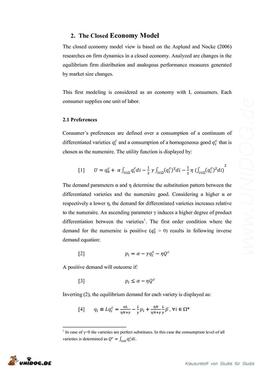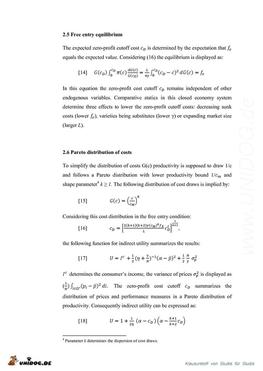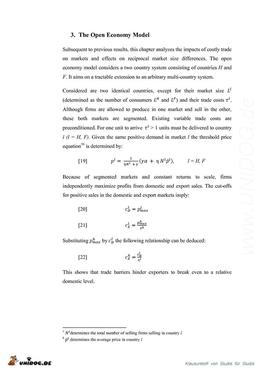| Dokumente | |
|
|
Dokumentvorschau |
The Prize of Size - Impacts of Liberalization in Monopolistic Competition |
Dokument-Nr.: F-ABOD |


|
|
Dokument-DownloadUm Zugriff auf dieses Dokument zu erhalten, musst Du Mitglied der UNIDOG Community sein. |
|
Inhalt / Beschreibung
Untersuchung von Marktgrößeneffekten auf Firmen-Gleichgewichtsverteilungen auf Basis des Melitz und Ottaviano Working Papers von 2008. Betrachtungsweise sowohl in geschlossener, als auch in offener Wirtschaft.
Gliederung: 1. Introduction 2. The Closed Economy Model 2.1 Preferences 2.2 Production technology and profit maximization 2.3 Free entry equilibrium 2.4 Pareto distribution of costs 3. The Open Economy Model 3.1 Free Entry 3.2 Reciprocal dumping 3.3 Effects of trade 3.4 Market size impacts 4. Trade Liberalization 4.1 Isolated two country view 4.2 Preferential liberalization 4.2.1 Long run equilibrium 4.2.2 Short run equlibrium 5. Conclusion References
Abstract: Traditional theories of international trade as the Ricardian-Model determine a flow of goods between two countries based on the setting of comparative advantage. Incorporating the main part of international trade to take place between countries of the same economical strength integrated trade theories have been developed, reckoning the consumer’s preference for variety. Helpmann (1999) develops a modification of an international trade system, considering differences in technology, factor price and trading cost. Latest research has especially been concerned with a constitution of a monopolistic competition system with heterogeneous firms, considering effects of trade liberalization. In Tybout and Erdem (2003) the liberalization leads to a reduction in firm mark-ups. This effect results from the thesis that a constant elasticity of substitution denotes fix markups. |
|
Vorschau-Ausschnitte
|
||||







